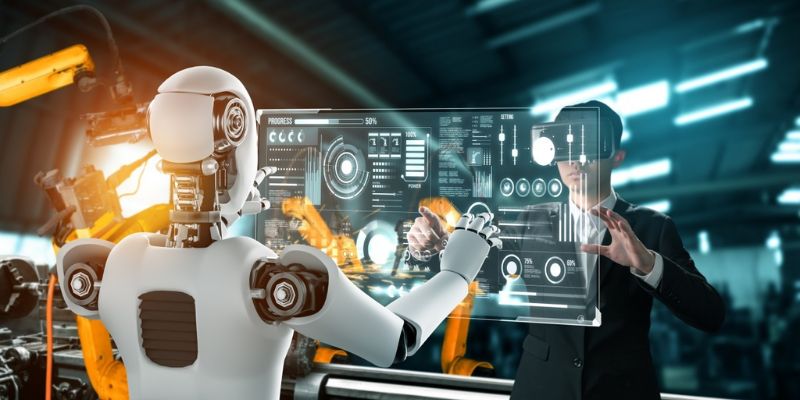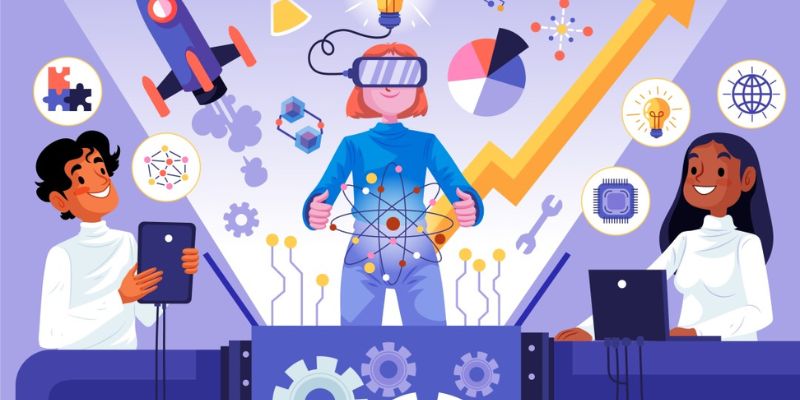Will RPA replace human jobs? It’s the big question as we race into a future where Robotic Process Automation (RPA) is not just a tech buzzword but a real game changer in our workplaces. People worry that machines will edge us out of the job market, yet, it’s not all doom and gloom. Dive with me into the heart of this revolution where humans and bots may just become the ultimate team. Understanding the true reach of RPA and the kind of tasks it can handle will shed light on this heated topic. And yes, while some jobs may see a sunset, new doors are swinging wide open. So let’s finger-walk through the fine details and unravel the threads of this digital transformation, because the answer to “Will RPA replace human jobs?” is not a simple ‘yes’ or ‘no’.
Understanding RPA and Its Role in the Modern Workforce
Clarifying What Robotic Process Automation Entails
Think of Robotic Process Automation, or RPA, like a digital worker. It uses software to get tasks done fast and without error. It’s like having an extra hand to help you with your work. But, it’s not a hand—it’s a computer program. It can do things over and over without getting tired or making mistakes.
Assessing the Breadth of Tasks RPA Can Perform
Now, what can RPA do? It can do a lot. It works best with jobs that are the same each time. These are jobs like entering data, sorting files, or handling simple customer questions. It sounds simple, but it really changes how work gets done.
This means workers can focus on stuff that needs a human touch. This includes talking with customers, making decisions, and being creative. These are all things that robots can’t do.
For some folks, RPA sounds scary because it can do things that people do at their jobs. This raises a big question: Will RPA replace human jobs? No, not fully. RPA takes over the boring tasks no one likes. This lets people do more interesting work.
But, we must be honest. Yes, some jobs will change a lot because of RPA. In places like factories, banks, and hospitals, it’s already happening. RPA makes things run faster and with fewer mistakes. This is great for businesses because they save time and money.
Sometimes, RPA can do a job that a person used to do. This is called “job automation.” When this happens, it’s important for companies to help their workers learn new skills. This is known as “upskilling.” It means teaching people to do things that RPA can’t.
The world of work is always changing. We’ve seen it before when computers first came into offices. Now it’s RPA’s turn to mix things up. RPA isn’t just about taking jobs away. It’s also about making new kinds of jobs.
These new jobs could be about working with RPA software. They might be jobs that we can’t even think of yet. This is the “future of work,” and it’s filled with both tech and people. It’s an exciting time, but only if we handle it right.
If we plan well, RPA can make jobs better. It can take away the dull parts and leave more room for the fun parts. For people who work with their hands, it can make their jobs less of a strain. For folks who work in an office, it can give them time to think more and type less.
So, as we bring more RPA to the workplace, we have a chance. We can make our work days better and help everyone get along with these new tools. It’s about humans and machines working together. That’s how we’ll make the best of what tech offers, without leaving people behind.

Analyzing the Impact of RPA on Employment
RPA Contribution to Technological Unemployment
Will RPA take away jobs? Yes, some jobs will be impacted directly by RPA. Robotic Process Automation, or RPA, makes some manual jobs unnecessary. That’s because simple, repetitive tasks are perfect for bots. This shift is real and it’s called technological unemployment. It means that machines, like bots, can do some jobs better than humans. In areas like data entry or scheduling, RPA is faster and more accurate.
So, what happens to people whose jobs are affected? The truth is, they may need to find new types of work. Companies must help with this change. How? By training folks for more advanced jobs. We can’t ignore those hit hardest by job automation. Support from all corners is key to guide them towards new career paths.
How RPA is Transforming Job Roles and Creating New Opportunities
Now, let’s look on the bright side. Does RPA destroy all jobs? No, it actually creates new ones too. RPA changes the game by shifting the types of jobs needed. It frees us from dull tasks. Instead, we focus on work that needs human touch — things like problem-solving and customer care. This is the future of work we’re looking at.
We’re not just losing jobs, we’re getting new ones. Careers in managing bots, or improving them, are booming. We’re talking about career prospects in automation like RPA developers and analysts. And guess what? These jobs often pay better and are more rewarding.
Industries everywhere are feeling the RPA effect. Financial services are processing loans faster. Healthcare providers are managing records like never before. All thanks to RPA making things more efficient. RPA in financial services and healthcare is not just a trend; it’s a major improvement.
Robots replacing manual labor is just one piece of the puzzle. The larger picture includes RPA and human collaboration. Think about a workspace where humans and bots help each other out. This isn’t science fiction; it’s happening right now. People are working alongside bots, each doing what they do best.
RPA isn’t just about cutting costs or making quick wins. It’s about improving job quality and job security through smarter work. We need to be smart and think long-term. Upskilling is crucial. Companies should invest in teaching workers new skills. Skills that let them grow with the bots, not be replaced by them.
RPA is more than a change; it’s a chance. A chance to do better, work smarter, and create jobs that didn’t exist before. It’s up to us to harness this technology. To make sure everyone has a spot in this new world of work. Let’s not fear RPA; let’s shape a future where everyone wins.

The Human-Machine Synergy: Collaborative Future or Competition?
Case Studies: RPA Enhancing Human Efficiency
Will RPA replace jobs? In short, not quite. Robotic Process Automation, or RPA, changes how we work. It takes over dull, repeat tasks we do at computers. Think of RPA as a software robot. It copies clicks and types just like a person. But RPA isn’t here to take our jobs away. It’s about teaming up.
Look at a bank that used RPA. Before, workers spent hours checking forms. Now, bots do that work. People focus on helping customers. They solve problems, think of new ideas, and feel happier at work. That’s RPA enhancing human efficiency. Workers are more than their tasks. They offer what bots can’t: care, creativity, and communication.
Upskilling: Preparing the Human Workforce for an Automated Era
Technology changes fast. We must too. The key is upskilling. That means learning new skills for the future. As RPA takes on simple tasks, we can do more complex work. It’s like getting promoted because a bot handles your old job.
To get ready, we need to learn alongside RPA. Schools are starting to teach more about RPA. Online courses are popping up. And companies offer training. Workers learn to manage RPA software or analyze data. These are skills for the future. So RPA doesn’t just change jobs. It can lead to better ones.
Upskilling helps everyone. Workers, companies, even whole industries. Yes, some jobs will change. Some might end. But upskilling gives people a path forward. It’s not man versus machine. It’s man with machine, growing together. This wave of automation can lift us to new heights if we learn to surf it.
RPA impact can be big on employment. But we can shape this impact. By combining human talent with robotic speed, we craft a workforce ready for tomorrow’s challenges. Automation opens doors. It’s up to us to step through, skilled and ready.
Navigating Ethical and Legal Terrain in the Age of Automation
Ethical Implications of Job Automation
Will robots take our jobs? Not all, but some. Robots do tasks faster and make fewer mistakes. This truth scares many people. Automation does put some jobs at risk. Yet, it’s not just about who does the work. It’s also about how we make these choices.
When companies use robots, they must think about their workers. It’s not fair to just replace someone without warning. People need time to learn new skills. They need support to shift into new jobs. Jobs that robots can’t do – those needing a human touch.
RPA software is smart but doesn’t have a heart. It doesn’t know right from wrong. This is where we come in. We must ensure the impact of RPA on employment is not harmful. Robotic process automation should make jobs better, not just go to the one that’s cheaper.
Here’s the deal. RPA changes jobs, sure. But it also creates new ones. And these jobs can be more about thinking and less about doing the same thing over. This way, AI and job loss won’t just be a scary story. It can be a tale of humans and machines working side by side.

RPA’s Intersection with Employment Laws
Now, let’s dive into the thick of it. Is it legal to let robots take over jobs? Technological unemployment is a real thing. And it means we have to look closely at our employment laws.
Think about a factory worker whose job a robot can do. If that worker loses their job, what happens next? Well, the law says that companies should not fire people without a good reason. They have to follow rules. They have to give notice and help workers find another way to earn a living.
Automation replacing jobs is part of the future of work. But this future has to be kind, and it has to be fair. RPA and employment law cross paths here. The law must protect workers but also allow progress. It’s a tightrope walk, but it’s possible with the right balance.
Companies have to look at the risks of RPA job displacement. That brings me to RPA’s role in all this. It’s not just a tool to cut costs. It should also be a way to help workers do better. It should give them the chance to learn new things. Maybe even things they love more than the job they had before.
We have new words in our work world today. Words like upskilling for RPA. That means teaching workers new skills they need because of robots. It’s a good word. It means that yes, the machine takes the old job. But we give that person a new, maybe even better, job in return.
So to answer the big question. RPA and human collaboration? Yes. It’s not robots against us. It’s us with robots. Together, we can make work something great. And that’s the kind of future I want to be part of.
We’ve talked a lot about RPA—how it works and the jobs it can do. We’ve seen RPA may lead to fewer jobs in some areas, but it’s also making new kinds of work. It’s not just competition between humans and machines. It’s about them working together. People are training for new skills to stay ahead. And, we must think about what’s fair and right in this new automated world.
So, what do I think? RPA is a big deal. It’s changing work in ways we’ve never seen before. Yes, there are challenges. But there are also chances for folks who learn and adapt. I say, let’s get ready. Let’s make sure we use RPA in ways that help everyone. Let’s be smart about it and not forget that in the end, it’s about making work and life better for people.
Q&A :
Will RPA completely replace human jobs?
While Robotic Process Automation (RPA) is designed to automate repetitive and routine tasks traditionally performed by humans, it is not expected to completely replace human jobs. RPA is better suited for tasks that involve structured data and rule-based processing. Human jobs that require creativity, complex decision-making, and emotional intelligence are less likely to be replaced by RPA.
How will RPA transform the future workforce?
RPA is transforming the future workforce by allowing companies to streamline operations and free up human employees to focus on more strategic, creative, and customer-focused initiatives. The integration of RPA is creating new roles and opportunities, such as RPA developers and analysts, while prompting existing workers to upskill and engage in more valuable tasks.
What types of jobs are at risk of being replaced by RPA?
Jobs that are at high risk of being replaced by RPA typically involve repetitive, clerical tasks that can be easily automated. These can include data entry, processing transactions, and managing simple customer queries. However, many organizations are also looking to pair human abilities with RPA’s efficiency to enhance job functions rather than replace them outright.
Can implementing RPA in a company lead to job losses?
Implementing RPA can lead to job displacement in certain sectors, particularly where tasks are highly repetitive and rule-based. However, many companies implementing RPA find that it can also lead to job creation and the evolution of current roles, emphasizing the importance of upskilling and adapting within the workforce.
What should workers do to ensure they remain valuable in an RPA-driven world?
To remain valuable in a workforce increasingly influenced by RPA, workers should focus on enhancing their soft skills such as problem-solving, critical thinking, and communication. Additionally, learning to work alongside digital workforces and gaining skills in RPA management or oversight can make an individual an invaluable asset to any future-focused company.



